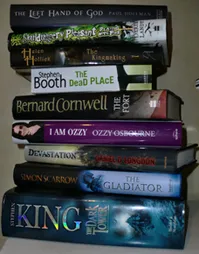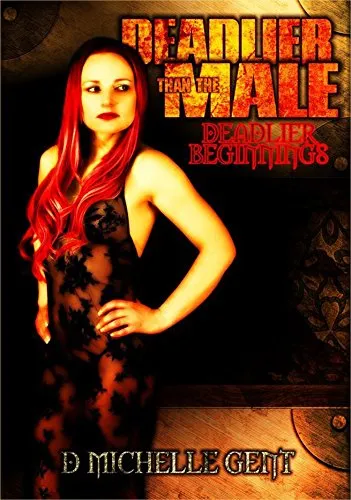
My Background:
I’m an Author.
I have five full novels, an anthology of short stories and a collection of seven short stories published, plus a number of stories and articles published in magazines and one multi-author anthology. UK US
I work as a professional Editor for a small Indie Publishing House.
I have a few years’ experience in publishing.
I was Editor in Chief of a large online magazine (approx. 100,000 hits per month at its peak).
My second novel, Cruel and Unusual was entered for The Orange Prize For Fiction in 2012.
I’ve written screenplays for movies and at least one of my stories has been made into a film.
I have a page on IMDB.
Pictures either with permission or from Google free to use image search
Writing a book is easy...
I can tell you how I write a book. I can tell you how other people write their books, that’s easy, it’s researchable – anyone can find that information. I think the reason you’re reading this is because you want to learn how YOU write a book.
I’m going to try to help you with that.
Part 1
You need to get into the habit of asking questions.
What genre do I want to write in? (That’s not even structured correctly - In which genre do I wish to write? is correct English, but let’s not get pedantic...)
My advice is to write in the same (or at least similar) genre that you like to read – it’s a variation on ‘write what you know’. Don’t plough headlong into a Sci-fi epic, high-fantasy tale if you’ve only ever been interested in romantic short stories. Think about it, how will you go about writing a full-length story about a subject you’ve never experienced? It may work, but the probabilities are stacked against you, and in an industry where there are thousands, perhaps millions of competitors, why stack yet more odds against your chance of success?

Choose the genre carefully because it’s best if you know it inside-out.
You also need to realise that this is going to be hard work. Not many people can write 5000 words a day, every day – I certainly can’t and I don’t know many authors that can – and once you get your head around the fact that this book, your book, will not be written in a weekend, the better off you’ll be.
I know it sounds like I’m throwing all sorts of obstacles in your path to writing success, but think about it, if these few words are putting you off, just how committed to your book are you? And one thing is for absolute-double-damned-sure, you HAVE to be committed to writing your book(s).
Back to it then…
Genre
What books do you read? What titles are on your bookshelves? If you take a look (go on, I’ll wait) which names are written most often on the spines of the books you buy, borrow or steal?
Stephen King, Dean Koontz, Anne Rice?
Maeve Binchy, FAITH MARTIN, LJ Ross?
Bella Forrest, Blake Crouch, Michel Faber?
Horror, Romance, Science Fiction – in that order.
I suppose, if you have all the names on your shelves, you’d be set to write a romantic sci-fi horror, but those genres don’t usually all mix together. Still, stranger things have happened.
I must add one warning.
If you’re writing a book because you believe it’s going to be easy, get out right now. I doubt Stephen King, Anne Rice or J K Rowling would agree with you and they would know better in this case.
Please don’t try to be clever about this. Writing a book in the ‘best selling’ genre will NOT work – really, honestly and truthfully, it will NOT. Writing a book for profit works best if you have a massive following that hangs on your every word and want to throw their money at you because they’ve loved everything else you’ve ever written.

In other words, you need a following and you need a back-catalogue. If you’ve not got BOTH of those things, then you need to move on and forget that strategy.
I’ve read the ‘rule of thumb’ is to have at least 6 books in your back-catalogue before you can even start to think about writing full-time without other work. That’s because your readers, if they like what you’ve written, will perpetuate your book sales by buying your seven books and raving about your writing on review sites and the like. Those things – 7 books, followers, fans and perpetual sales – don’t come easy. I know I keep banging on that same drum but it carries a tune, I promise.
Of course, you could get a Ghost-writer to do the hard work for you, but that means putting your money up front and hiring a good Ghost-writer. @markrmorrisjr is one I know of and he’s good, he makes a living from it, and he charges for his time, his experience and his expertise.
Back to the questions.
Is my story worth telling? Of course, if it’s not, then your journey ends right here. If you don’t think it’s worth telling, then no-one will think it’s worth reading. Save yourself some time and go to the next project.
You should now have a genre and the knowledge that your story is great. The next thing to figure out is whether your story is complete.
Well, is it? Does it have a start, a middle and an end? Again, if you are missing even one of those vital components, you may as well not bother starting to write because you really do need all three. And in case you’re asking, a title for your book does not constitute a start.
You need a hook, a great start, believable and likeable (or loathe-able) characters and a scene to hook your reader in so they want to keep on reading until their eyes bleed (or at least until they get sleepy and can’t read any more).
When I started writing Deadlier Than The Male, my first novel, I didn’t have ANY of those things! I didn’t have experience of writing books either, just articles for magazines and blogs.

That journey started in 1999, almost two decades ago and what I’ve learned in that time, I’m going to try to share with you. If you want me to share it all with you, of course.
I started Deadlier with this scene:
Hazel walked slowly towards the boundary of the wood. Her Wolfhound – Mika - was missing and had been gone all day. As she pulled her woollen wrap tighter round her shoulders her pace was slowing as she neared the trees.
She called out for him often "Mika! Mika!" Listening to hear the deep bark from him, she walked on.
She wandered further into the woods. It was getting late and starting to grow dark and she perhaps should have been thinking about getting back home to wait and see if Mika could find his own way home. Before long she was out of the less densely wooded area and into the forest proper.
"MI-KA! MI-KA!" She shouted again.
Hazel’s voice was starting to sound shaky and she was on the verge of tears, but she didn’t stop looking for him.
Dusk was beginning to steal visibility; every shape was melting into shadows and darkness. Trees and bushes were becoming indistinct shadows and she was starting to shiver not so much with cold as with fear.
Startled at the slightest noise, Hazel decided to turn around and go home without Mika.
As she turned, she froze at the sound of a large branch snapping over to her left followed by total silence.
It was the utter deathly silence that came after the snapping sound that set her yet more on edge.
The noise was not a natural sound made by a creature going about its usual business of survival. Whatever had snapped the branch was large and either aware of the noise and was now trying to conceal its whereabouts or had deliberately broken the branch to see her reaction.
Cocking an ear and listening intently, she started moving again, as quiet as possible she picked her way back down the overgrown and - at times - indistinct pathway. Whatever was following her was keeping very quiet but the silence which enveloped her told her that it had not gone away and the smaller inhabitants of the wood disliked it as much as she did - they were either scattered or sheltered.
If you’ve read my books – or the book I shared early on in my Steemit.com career, you’ll notice that this scene doesn’t appear in the book until Chapter 3 and there’s a good reason for that – it’s because I was ‘winging it’ as I wrote it.
I had no idea how to write a book and I had to alter and change things as I went and the book took 2 years to write.
Last year, I wrote a book in 6 weeks. I admit Ash and The Favour Man was not as big as Deadlier, but if I expand Ash to the size of Deadlier and multiply the time by the same, (170,000 words for Deadlier and around 45,000 for Ash), I’d still have a book finished within 24 weeks – a quarter of the time it actually took.
Want to know more?
Drop by tomorrow… I’ll have another tip for you.